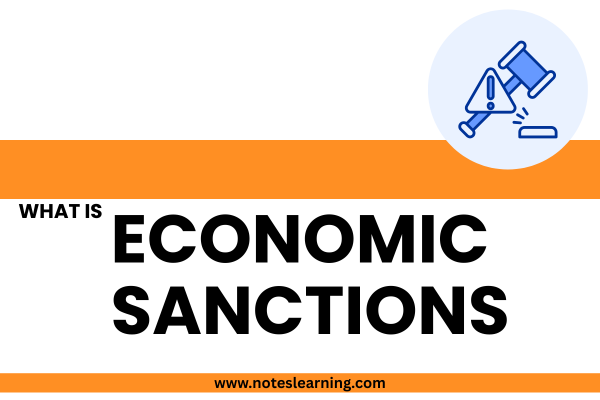What are Economic Sanctions ?
Economic sanctions are a key foreign policy tool in international diplomacy. It is a strategy or policy implementation to influence the actions of other nations by restricting trade, investments, or financial transactions. Sanctions affect economies by limiting access to global markets, financial systems, and essential goods. Economic sanction can be a small act of freezing assets to travel bans and trade restrictions.
Recent Economic Sanction
Russia (2024)
The United States, along with its close ties, put sanctions against Russia in 2024 as a response to its invasion of Ukraine. Many countries enforce sanctions on major Russian financial institutions. This isolated the Russian economy from global financial markets.
Iran (2024)
The United States put sanctions on individuals and entities linked to Iran’s ballistic missile and drone programs. This sanction was targeted on involved companies providing material support to the Iranian government.
Hamas Related Sanctions (2023-2024)
Regular intervention of Hamas on Israel led to the U.S. imposing multiple rounds of sanctions disrupting the financial networks that fund Hamas operatives.
How do Economic sanctions work ?
Sanctions work by affecting a target’s economy by pressurizing the sanctioned country to change its behavior. Economic sanctions may include blocking international financial transactions, freezing assets, banning imports or exports and restricting access to technologies. Economic sanctions work because:
- It exerts economic pressure by restricting access to financial markets, block exports and imports, or freeze assets. Such actions result in economic strain to the target country and can no longer perform economic activity freely.
- Sanctions isolate target countries diplomatically by discouraging the allies from dealing with the sanctioned nations.
- Sanctions discourage third parties either companies or countries to participate in any trade relation with sanctioned countries as they fear secondary sanction on them.
- Generally sanctions target issues like human right violation, political instability, violation of international law, ill practice of rights etc. Everyone is united when it comes to sanctioning countries or companies with such issues. Therefore, sanctions work.
Some of the methods countries use to exert pressure on other countries i.e. sanction are:
- Sanction can be in trade restriction form. Countries exert pressure by prohibiting trade of specific goods or services. Similarly, sanctions can be by prohibiting the sale of weapons to certain nations. For instance, the US banned the import of Russian oil and gas. Similarly, countries have prohibited the sale of weapons to North Korea and Iran.
- Another form of sanction is freezing the assets. This means, the government decides to block the access to assets held in their financial institutions. The US froze the assets of Russian Oligarchs available in different American banks.
- Limiting financial practice is another act of sanction. Many companies disregard the financial transaction to and from financial transactions.Russia was removed from SWIFT banking network. Similarly, many countries, as an act of sanction, prevent companies and allies from making a foreign investment.
- Countries ban traveling from and to the sanction countries. This ban includes government officials, business elites, specific individuals etc.
- Another way to imply sanction is to have sectoral sanction. This is quite a common sanction where countries focus on key sectors for instance agriculture, defense, banking and restrict all the activities related to these sectors. This exerts pressure on the sanctioned country.
- Export control is another way to exert pressure. Here, countries control the key export component to the sanctioned country so that it impacts all factors related to the component. For instance, controlling the export of advanced computing chips will lead sanctioned companies to struggle with all the factors or sectors which require the advanced computing chips,
Are economic sanctions effective ?
Economic sanctions are a socio-economic and political strategy. The effectiveness of any strategy is very subjective to its cause and implementation. There are some cases where economic sanctions have successfully been used to negotiate, change policies or make things favorable. Data suggest that 34% of the sanctions imposed between World War I and early 2000s have been successful to achieve its intended goals i.e. modest policy changes. Similarly, sanctions on Russia and Iran have been less effective in forcing the changes.
Successful Economic Sanctions
- South Africa (Apartheid Era) : United States, European countries along with other global actors imposed economic sanction on South Africa. The sanction was imposed to pressurize the government to end apartheid. This sanction made South Africa economically weak leading to internal protest and resistance, ending apartheid in 1991.
- Libya (2003) : Differentiation countries imposed sanctions on Libya saying that Libya was supporting and was involved in terrorist activities. Sanctions impacted the economy of Libya especially the oil business. Later, due to sanction, Libyan Leader Muammar Gaddafi dismantled the country’s weapon of mass destruction programs.
Unsuccessful Economic Sanctions
- North Korea (2006-Present) : United Nation and European Union has been imposing different sanctions on North Korea for its nuclear program and human right abuses.Despite these sanctions, regime of Kim Jong-un has not changed and has continued to advance the nuclear strength.
- Russia (2014-2024): The events like annexation of Crimea in 2014 and invasion of Ukraine in 2022 have led to multiple sanctions on Russia from world economies. Despite sanction on finance and technology, Russia has been operating soundly due to its parallel system like China and India.

